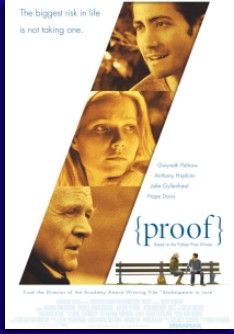

Reviewed by
Bud Carlson


David Auburn’s Pulitzer Prize-winning play “Proof” is a very moving and important examination of the impact that being a young-adult caregiver for an older parent can have on the caregiver. The sacrifices that are made are obvious, but the psychological toll of watching up close as a loved one declines and eventually passes is really what the topic that is examined brilliantly in this story. Aided by Rebecca Miller, Auburn turned the play into a movie screenplay, and the result is the 2005 film Proof, which starred Gwyneth Paltrow, Anthony Hopkins, Hope Davis, and Jake Gyllenhaal.
In the film, Catherine (Paltrow) devotes the prime years of her life (from around ages 22-27), taking care of her schizophrenic father Robert (Anthony Hopkins), a world-renowned mathematician. Throughout the film, Catherine carries around the weight of the burden, remorse, guilt, resentment, loneliness, and sense of loss that only one who as been a caregiver can truly appreciate. Perhaps the sacrifice she has made is best summed up in a scene when her father tells her that she should go out with friends to celebrate her 27th birthday instead of staying home with him, and she replies “In order for your friends to take you out, you have to have friends to begin with.” Does it mean she’s a loser with no friends? No, it is a symbol of the price she has paid for caring for her father for the last five years of his life.
Catherine worries that she will, or has, inherited her father’s illness, while he discourages this type of thinking, telling her “crazy people don’t sit around trying to figure out if they’re nuts.” The rub about this conversation? Robert has already passed away, and Catherine is actually talking to herself. Robert (or at least Catherine’s memory of him) points out that this is not a good sign, a joke referencing something Cathy’s fear that she may have inherited his mental illness, along with his genius for

math. Cathy’s sister Claire (Hope Davis), a meticulously-organized and fussy gal, blows into town for the funeral, and is worried about her sister. She insists that Cathy come and live with her and her fiancÚ in New York. Does she have reason to worry? Well, Cathy hasn’t done much lately, hanging around the family’s old house, talking to her deceased father … I guess you can’t really blame Claire for thinking she might be losing it. But at the same time, Cathy shows an awareness of her situation, the realization that something must be done to help her get her own life on track now that Robert is gone.
Hal also enters into the mix here. Played by Jake Gyllenhaal, Hal is one of Robert’s former students and a budding young math geek himself. He has accepted the task of looking through Robert’s handwritten notebooks on mathematics, all written since he officially retired (became mentally ill), and finds all but one of them to be total gibberish. That one notebook, however, seems to include a brilliant new proof, a monumental event in the world of mathematics if it’s true. But did Robert write it? Or did Cathy?
The complicated world of higher mathematics is but a backdrop for the film, with the core of the movie being the characters and their relationships with each other. Director John Madden has allowed the words and dialogue of Auburn’s smart (but not inaccessible) script to carry the day. And the central dynamic is first between Paltrow and Hopkins, and then between Paltrow and Davis. Hopkins (seen in flashbacks as well as in Cathy’s mind) is credible as a former math genius who feels the frustration of having his mind slowly but surely break down, and the moment in the movie when his mind proves itself to be irreversibly gone is a sad one. Paltrow and Davis are believable as sisters and both are reliable actresses in their own right. Claire’s concern is hidden under a layer of efficiency and organization, while Cathy’s common sense is lost under all that instability and sacrifice – the makings of two very solid performances.
This is a movie about people and relationships, not about mathematical concepts. It is a story about a daughter / caregiver’s personal sacrifice, in which we learn how great that sacrifice really was as the story plays out. Fairly heady stuff, and well worth your time to check it out.
